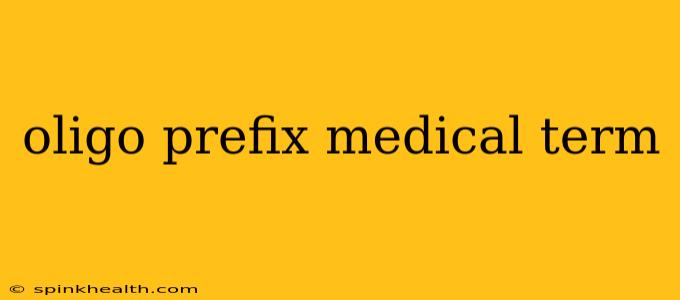The prefix "oligo-" might seem daunting at first glance, especially within the complex world of medical terminology. But fear not! This seemingly obscure prefix holds a surprisingly straightforward meaning, and understanding it unlocks a deeper comprehension of various medical conditions. Think of it as a secret code, once cracked, revealing a wealth of information about a patient's health.
My journey into the world of medical prefixes began with a simple curiosity. I was intrigued by how seemingly small additions to a word could drastically alter its meaning. The prefix "oligo-", I discovered, plays a crucial role in shaping the meaning of many medical terms, painting a clearer picture of the conditions they describe. It literally translates to "few" or "scanty," implying a deficiency or lack of something.
Let's delve into the fascinating world of "oligo-" and explore some common medical terms where it appears:
What does oligo- mean in medical terms?
As mentioned, "oligo-" signifies a small amount, deficiency, or scantiness of something. This "something" is usually specified by the root word following the prefix. For instance, oligomenorrhea refers to infrequent or scanty menstrual flow. The "menorrhea" portion points to menstruation, while "oligo-" indicates the reduced frequency or volume.
Common Medical Terms Using "Oligo-":
Here are some examples to illustrate the diverse applications of "oligo-":
-
Oligomenorrhea: As discussed, this indicates infrequent or light menstrual periods. This isn't just about missed periods, but also a reduction in the usual menstrual blood flow. Understanding this difference is crucial for accurate diagnosis and treatment.
-
Oligospermia: This term relates to a low sperm count in semen. It's a significant factor affecting male fertility, highlighting the connection between the prefix and its impact on reproductive health.
-
Oligodendroglia: This refers to a type of glial cell in the central nervous system that produces myelin, the protective sheath around nerve fibers. "Oligo-" in this context doesn't imply a deficiency of cells, but rather their small size and specific function compared to other glial cells.
-
Oliguria: This describes the production of a small amount of urine. It's a symptom that can indicate various underlying medical issues, ranging from dehydration to kidney problems. Therefore, understanding the meaning of "oliguria" is crucial for a timely and accurate diagnosis.
-
Oligodontia: This refers to the condition of having fewer than the normal number of teeth. It could involve missing one or multiple teeth and might warrant further investigation to determine the underlying cause.
How is oligo- used in clinical practice?
The prefix "oligo-" serves as a vital component in clinical diagnoses and descriptions. Doctors use these terms to concisely and accurately communicate the nature of a patient's condition. For example, a diagnosis of "oligospermia" immediately indicates a potential fertility issue requiring further investigation. Similarly, a finding of "oliguria" triggers a deeper examination to ascertain the underlying cause, such as dehydration, kidney disease, or obstruction in the urinary tract.
What are the possible causes of oligo- conditions?
The causes of conditions characterized by the "oligo-" prefix are varied and depend on the specific term. For example, oligomenorrhea can stem from hormonal imbalances, stress, weight loss, or certain medications. Oligospermia may result from genetic factors, infections, hormonal issues, or lifestyle choices. Similarly, oliguria can be a symptom of dehydration, kidney disease, or urinary tract obstruction. It’s critical to understand that "oligo-" indicates a symptom, not a diagnosis in itself, requiring further investigation to find the underlying root cause.
What are the treatment options for oligo- conditions?
Treatment approaches for "oligo-" conditions are equally diverse, reflecting the multifaceted nature of the underlying causes. For instance, oligomenorrhea may respond to hormone therapy, lifestyle changes, or stress management techniques. Oligospermia treatments might include medication, lifestyle modifications, or assisted reproductive technologies. Treatment for oliguria would focus on addressing the underlying cause, such as rehydration for dehydration or treating kidney disease or urinary tract obstructions. Therefore, the specific treatment strategy varies widely depending on the condition and its root cause.
By understanding the meaning and application of the prefix "oligo-", healthcare professionals can quickly and effectively grasp the essence of various medical conditions and develop appropriate diagnostic and treatment strategies. From the seemingly simple meaning of "few" or "scanty," emerges a powerful tool for understanding a spectrum of medical complexities. This highlights the crucial role of medical prefixes in building a deeper understanding of medical terminology and improving patient care.

